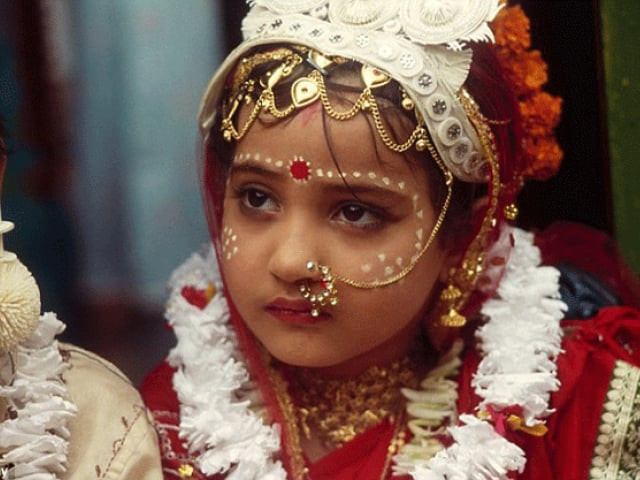Child marriage is technically a punishable offence in India. If a male over the age of 18 is found guilty of marrying a child then the accused shall be punished under the Prohibition of Child Marriage Act of 2006. The punishment, which is also applicable to parents and guardians of the child, is either rigorous imprisonment of two years, or fines which may extend to Rs1 lakh, or even both in certain cases.
Despite the law, cases where girls as young as 15 or 16, of both Hindu and Muslim faith, are forced to marry continue to peak. The most inhumane cases are reported, particularly in Hyderabad, of meek young girls from impoverished families being forced to marry ageing Sheikhs for the sake of money for their family’s survival.
Contradictory laws have made the situation worse. A 2012 ruling by the Delhi High Court, for instance, allows Muslim girls as young as 15 to marry once they reach puberty. Similarly, Section 375 of the Indian Penal Code considers forced sex in marriages as a crime if the wife is below the age of 15. Such laws, then, act as loopholes, allowing rapists in many cases to escape prosecution. Not only did this allow underage girls of any faith to be married off, it also created a circumstance where an unmarried underage girl could sue her rapist, but a married one aged between 15 and 18 could not. This not only took away the girl’s right to her own body, including her reproductive choice, but also led to a rise in trafficking of female children under the guise of marriage.
The situation, however, will change with the new ruling by India’s Supreme Court. The landmark verdict declares sex with a minor to be rape, even if the couple in question is married. As marital rape is not a crime according to India’s legal framework, people could get away with child marriages without it being classified as rape. This will not be the case any longer, as if the child complains within a year of sexual intercourse, then the aggressor can be prosecuted for rape.
This ruling will protect girls from abuse and exploitation irrespective of their marital status, as opposed to the former laws that left too much room for dispute. The good thing is that this will hopefully also act as a deterrent against child marriages in India, especially in conservative rural areas where underage marriages continue to persist due to patriarchal norms, poverty, low education and weak law enforcement. If the Indian government does its job and implements the law formidably, even in remote villages, this may eventually encourage more girls to speak up, resist and challenge the long-standing injustices that they have grown to accept as normal.
However, in order for that to be possible, steps must be taken on the socioeconomic front. The literacy rate in rural areas has to go up, with more educational provisions for girls beyond the primary level. Most importantly, there has to be a rise in the economic status of the families living in areas where child marriages are more prevalent and where children are more vulnerable to be “sold off”.
The law can only be the first of many steps. If both the government and non-governmental organisations succeed in overcoming these socioeconomic hurdles, then the ruling will truly be a historic step in the right direction.
The next step, thus, should be for the Indian government to set aside funds in its budget that are allocated to spread awareness regarding the new law on a massive scale. When it comes to children’s rights, there are four P’s that are absolutely essential – protection, participation, provision and prevention. It is important that the Indian state focuses on these four pillars for the rights and well-being of its female children.
This will need to include a well organised network of representatives whom girls can contact directly in times of need. It is easy to pass a law that says a girl can report rape in the first year of sexual intercourse, but how will this be implemented? Little girls have witnessed children get married their entire lives, and have internalised it as a norm. How is a girl to know her basic rights and be aware that this is injustice, that it is wrong, and that she can finally do something about it?
Over the decades, there has been a consistent decline in child marriage cases in India, falling from 47% in 2006 to 27% in 2016. The problem, however, remains with the pace of this decline, which has been slow, especially in the ages between 15 and 18. Nonetheless, with this new law in place, along with the Protection of Children from Sexual Offences Act of 2012, and the aforementioned implementations, one can hope that these numbers will decline further in the years to come.
The need of the hour is to guarantee the working of all organisations in unity. The police, legislative and local bodies must work together in bringing about a much-needed informational campaign. Only by letting people know that this practice is wrong can we get them to obey the laws that are being created. This is the only way to ensure that this repugnant practice is uprooted and banished from India’s culture and societies unanimously, irrespective of religious beliefs.
It's easy to pass a law that lets young girls report marital rape, but how exactly will this be implemented?
How is a minor supposed to know her basic rights, or that marital rape, something she considered a norm, is injustice?

Meghawal says she was married off at 11 months old to a nine-year-old boy in her village. PHOTO: AFP


COMMENTS
Comments are moderated and generally will be posted if they are on-topic and not abusive.
For more information, please see our Comments FAQ